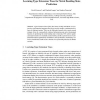382 search results - page 67 / 77 » Complexity and Expressive Power of Logic Programming |
120
Voted
SLP
1994
15 years 4 months ago
1994
We consider a hierarchy of modal event calculi to represent and reason about partially ordered events. These calculi are based on the model of time and change of Kowalski and Sergo...
233
Voted
ML
2011
ACM
14 years 9 months ago
2011
ACM
Abstract. Type Extension Trees (TET) have been recently introduced as an expressive representation language allowing to encode complex combinatorial features of relational entities...
163
Voted
LOGCOM
1998
15 years 2 months ago
1998
Planning algorithms have traditionally been geared toward achievement goals in single-agent environments. Such algorithms essentially produce plans to reach one of a specified se...
153
Voted
TPHOL
1999
IEEE
15 years 7 months ago
1999
IEEE
Abstract. We describe the key features of the proof description language of Declare, an experimental theorem prover for higher order logic. We take a somewhat radical approach to p...
125
Voted
IJAOSE
2010
15 years 1 months ago
2010
CASO is an agent-oriented programming language based on AgentSpeak(L), one of the most influential abstract languages based on the BDI (Beliefs-Desires-Intentions) architecture. ...

